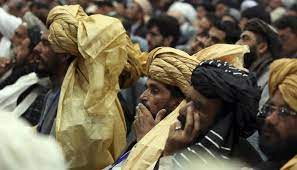Islamabad, May 31: A 50-member jirga (council) consisting of prominent tribal elders from Pakistan’s restive region bordering Afghanistan will fly to Kabul on Wednesday for holding peace talks with the outlawed militant group Tehreek-i-Taliban Pakistan (TTP), media reports said on Tuesday.
The delegation leaves for Kabul at a time when the Pakistan government and the banned outfit have agreed to extend the ceasefire indefinitely and continue talks to find a breakthrough to end decades of militancy in the region, the Dawn newspaper reported.
Former Senator Maulana Saleh Shah will lead the jirga, which comprises elders from all the major tribal districts, including South Waziristan, North Waziristan, Orakzai, Kurram, Khyber, Mohmand and Bajaur, as well as the Malakand Division, the News reported on Tuesday.
Public representatives, including former governor of Khyber Pakhtunkhwa Engineer Shaukatullah Khan, Senator Dost Mohammad Khan Mehsud and Senator Hilal Mohmand will also be part of this delegation.
“The jirga members were called to Peshawar and briefed about the peace process with the TTP,” the News report said, quoting a member of the jirga.
The jirga member said he wanted the TTP members to lay down arms, return home and live peacefully in Pakistan, according to the report.
Khan, who belongs to Bajaur tribal district, said he and all other members of the jirga were hopeful of the outcome of the peace talks, saying the situation in the region had changed after the exit of the US forces from Afghanistan in August last year.
“Jirga is the right forum to resolve issues. We Pakhtuns have the capacity to listen to each other and resolve issues through dialogue,” Khan said.
Another member of the jirga said they would be meeting senior TTP leaders, including chief of the banned outfit Mufti Noor Wali Mehsud and Maulvi Faqir Mohammad, the News report said.
Pakistan has been fencing the 2,600-km border with Afghanistan since 2017 to end terrorist infiltration and smuggling, despite intense opposition from the neighbouring country.
Besides the erection of a fence, the project also includes the construction of border posts and forts, and the raising of new wings of the Frontier Corps, the paramilitary force that guards the border.
When the Taliban returned to power last year, Pakistan hoped that the new dispensation would deal with these terrorist groups. Despite promises, the Taliban have not yet taken decisive action to fulfil their commitments, which has frustrated the Pakistan government.
Last month, the Taliban-led government in Afghanistan had started taking steps to shift terrorist groups away from the regions bordering Pakistan following a series of recent cross-border attacks that killed nearly a dozen Pakistani soldiers and prompted a strong reaction from Islamabad.
The Afghan Taliban will be playing the role of principal mediator between Pakistan and the outlawed militant conglomerate comprising several factions.
According to the jirga members, some of the TTP leaders had initially refused to participate in the peace talks with Pakistan, but the Afghan Taliban made it clear to all the factions that if they didn’t join the negotiations, they would have to leave Afghanistan.
“I think there is no option for the militant factions to stay away from the peace talks with the Pakistan Government. If talks with the TTP succeed, then all of them would return to Pakistan,” the jirga member added. (PTI)
Trending Now
E-Paper


